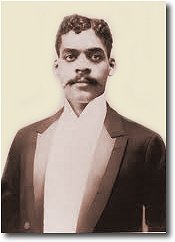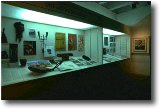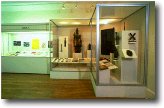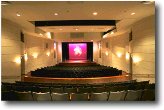
Arturo Alfonso Schomburg
One of the Best Known Names among Black Scholars
 |
|
"El negro americano tiene que rehacer su pasado
a fin de hacer su futuro. Aunque es correcto
pensar que América es el país donde no es
necesario tener un pasado, lo que para la
nación es un lujo viene a ser una necesidad
primordial para el negro. Una tradición de
grupo debe compensarle por la persecución
sufrida y el orgullo de raza servirla de
antídoto contra el prejuicio. La historia
tiene que devolverle lo que la esclavitud
le arrebató."
-- A. Schomburg |
|
(c) CopyRight - Prohibido copiar, reproducir
 Esclavitud en Puerto Rico: origen, abolición Esclavitud en Puerto Rico: origen, abolición
 NE OF THE BEST KNOWN NAMES among black scholars throughout the world
is Arturo Alfonso Schomburg.
Less known,
however, among both scholars
and the general
public, is the fact that
Schomburg was Puerto
Rican. NE OF THE BEST KNOWN NAMES among black scholars throughout the world
is Arturo Alfonso Schomburg.
Less known,
however, among both scholars
and the general
public, is the fact that
Schomburg was Puerto
Rican.
Born in San Juan on January 24, 1874, Schomburg
received his early education in Puerto Rico
and later attended college in the Danish
West Indies. At college, a white student's
comment that the black man had not accomplished
anything and never would was vigorously protested
by Schomburg, who riposted with information
on what Puerto Ricans of African descent
had done.
He cited particu larly
the work of José Campeche, whose paintings had created a stir in art
circles when they were exhibited in Rome,
and of Rafael Cordero, an impoverished cigar maker who had founded
a school and became a revered figure in the
field of education in the island. [Photos: Schomburg Center, New York]
|
|
 |
At the age of 23, Schomburg moved to New York
and continued amassing
an extraordinary collection of books, manuscripts, etchings
and memorabilia related
to the history of
the black people. In 1911,
with John Edward
Bruce and others, he organized
the Negro
Society for Historical
Research. Known as
the "detective of black
history,"
this "rotund, florid, gay
bibliophile"
traveled to Seville and
Granada in search
of records pertaining to
the slave trade,
arid later visited France,
Germany, England,
and other countries, adding
important items
to his collection. collection of books, manuscripts, etchings
and memorabilia related
to the history of
the black people. In 1911,
with John Edward
Bruce and others, he organized
the Negro
Society for Historical
Research. Known as
the "detective of black
history,"
this "rotund, florid, gay
bibliophile"
traveled to Seville and
Granada in search
of records pertaining to
the slave trade,
arid later visited France,
Germany, England,
and other countries, adding
important items
to his collection.
At the time of his death on June 10, 1938,
the collection was already
recognized as
one of the world's most
comprehensive compilations
of black history, literature
and art. Now
called the  Schomburg Center for Research in Black Culture
(103 West 135th Street,
New York, NY 10030),
the collection contains
representative works
of every major black author
and other items
pertaining to the history
of the black people.
And, among the Bruce papers,
there are some
60 Schomburg letters which
reflect, according
to the Calendar of Manuscripts in the Schomburg
Collection of Negro Literature, "the charming loquacity, the wide
interests, and the indefatigable
enthusiasm
of this born bibliophile." Schomburg Center for Research in Black Culture
(103 West 135th Street,
New York, NY 10030),
the collection contains
representative works
of every major black author
and other items
pertaining to the history
of the black people.
And, among the Bruce papers,
there are some
60 Schomburg letters which
reflect, according
to the Calendar of Manuscripts in the Schomburg
Collection of Negro Literature, "the charming loquacity, the wide
interests, and the indefatigable
enthusiasm
of this born bibliophile."
In 1926, the Carnegie Corporation purchased
his collection, and presented
it to the New
York Public Library. Retired
from his job
in 1929, Schomburg was
appointed curator
of the collection in 1932.
Source: Fundación Puertorriqueña de las Humanidades
(FPH)
|
|